Analysing Organisational Behaviour: Culture, Motivation at Hays Travel
VerifiedAdded on 2022/11/24
|16
|5429
|25
Report
AI Summary
This report provides an analysis of organisational behaviour within Hays Travel, a prominent UK travel agency. It examines how organisational culture, politics, and power dynamics influence individual and team behaviour, as well as overall performance. The report also explores the application of motivational theories, such as Maslow's hierarchy of needs and Vroom's expectancy theory, in achieving organisational goals. Furthermore, it contrasts the characteristics of effective and ineffective teams and assesses the significance of team development theories and philosophies in shaping workplace behaviour. The analysis incorporates models like Handy's Culture Model and Chanlat's theory of political behaviour to provide a comprehensive understanding of the factors impacting organisational dynamics at Hays Travel.
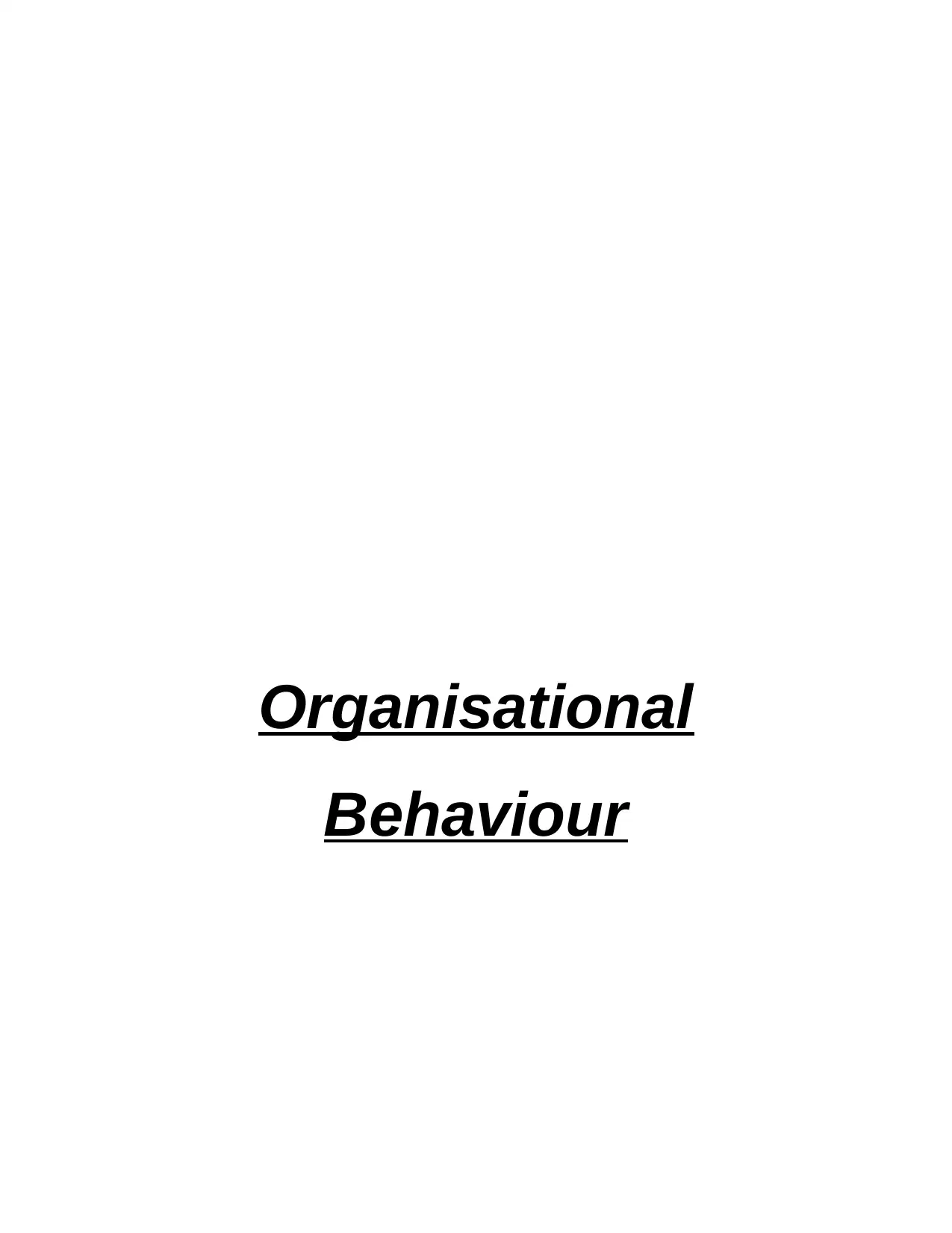
Organisational
Behaviour
Behaviour
Paraphrase This Document
Need a fresh take? Get an instant paraphrase of this document with our AI Paraphraser
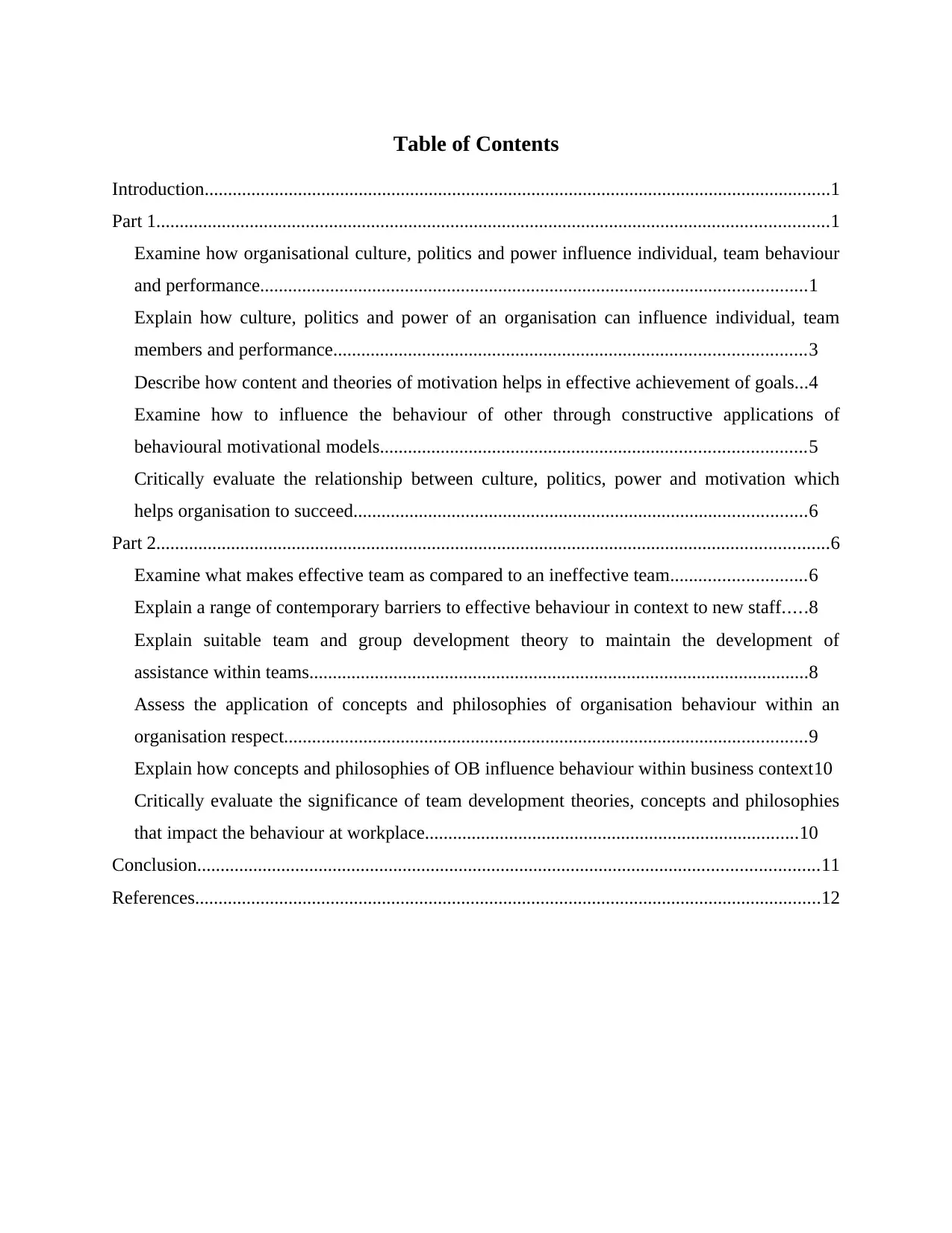
Table of Contents
Introduction......................................................................................................................................1
Part 1................................................................................................................................................1
Examine how organisational culture, politics and power influence individual, team behaviour
and performance.....................................................................................................................1
Explain how culture, politics and power of an organisation can influence individual, team
members and performance.....................................................................................................3
Describe how content and theories of motivation helps in effective achievement of goals...4
Examine how to influence the behaviour of other through constructive applications of
behavioural motivational models...........................................................................................5
Critically evaluate the relationship between culture, politics, power and motivation which
helps organisation to succeed.................................................................................................6
Part 2................................................................................................................................................6
Examine what makes effective team as compared to an ineffective team.............................6
Explain a range of contemporary barriers to effective behaviour in context to new staff.....8
Explain suitable team and group development theory to maintain the development of
assistance within teams...........................................................................................................8
Assess the application of concepts and philosophies of organisation behaviour within an
organisation respect................................................................................................................9
Explain how concepts and philosophies of OB influence behaviour within business context10
Critically evaluate the significance of team development theories, concepts and philosophies
that impact the behaviour at workplace................................................................................10
Conclusion.....................................................................................................................................11
References......................................................................................................................................12
Introduction......................................................................................................................................1
Part 1................................................................................................................................................1
Examine how organisational culture, politics and power influence individual, team behaviour
and performance.....................................................................................................................1
Explain how culture, politics and power of an organisation can influence individual, team
members and performance.....................................................................................................3
Describe how content and theories of motivation helps in effective achievement of goals...4
Examine how to influence the behaviour of other through constructive applications of
behavioural motivational models...........................................................................................5
Critically evaluate the relationship between culture, politics, power and motivation which
helps organisation to succeed.................................................................................................6
Part 2................................................................................................................................................6
Examine what makes effective team as compared to an ineffective team.............................6
Explain a range of contemporary barriers to effective behaviour in context to new staff.....8
Explain suitable team and group development theory to maintain the development of
assistance within teams...........................................................................................................8
Assess the application of concepts and philosophies of organisation behaviour within an
organisation respect................................................................................................................9
Explain how concepts and philosophies of OB influence behaviour within business context10
Critically evaluate the significance of team development theories, concepts and philosophies
that impact the behaviour at workplace................................................................................10
Conclusion.....................................................................................................................................11
References......................................................................................................................................12

⊘ This is a preview!⊘
Do you want full access?
Subscribe today to unlock all pages.

Trusted by 1+ million students worldwide
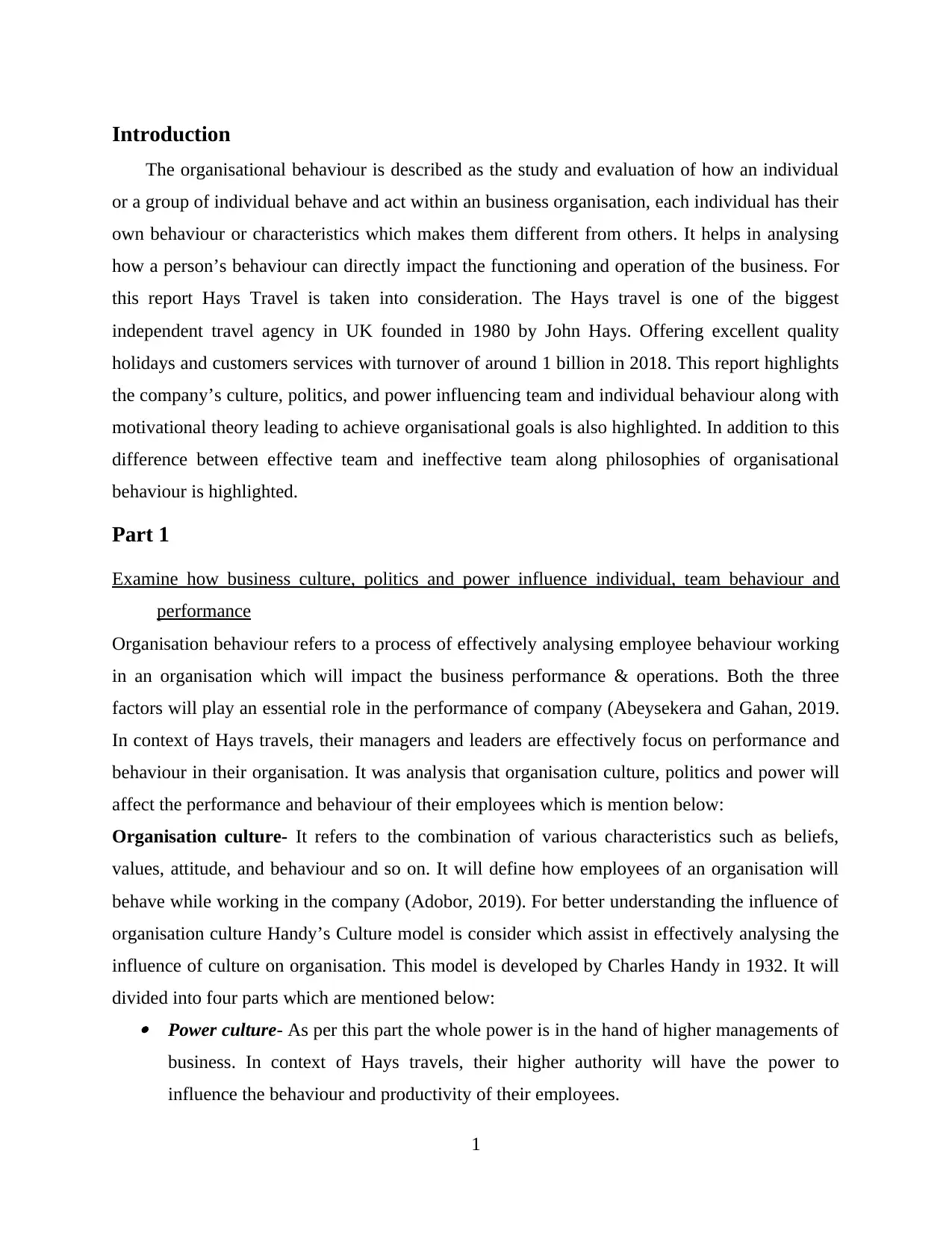
Introduction
The organisational behaviour is described as the study and evaluation of how an individual
or a group of individual behave and act within an business organisation, each individual has their
own behaviour or characteristics which makes them different from others. It helps in analysing
how a person’s behaviour can directly impact the functioning and operation of the business. For
this report Hays Travel is taken into consideration. The Hays travel is one of the biggest
independent travel agency in UK founded in 1980 by John Hays. Offering excellent quality
holidays and customers services with turnover of around 1 billion in 2018. This report highlights
the company’s culture, politics, and power influencing team and individual behaviour along with
motivational theory leading to achieve organisational goals is also highlighted. In addition to this
difference between effective team and ineffective team along philosophies of organisational
behaviour is highlighted.
Part 1
Examine how business culture, politics and power influence individual, team behaviour and
performance
Organisation behaviour refers to a process of effectively analysing employee behaviour working
in an organisation which will impact the business performance & operations. Both the three
factors will play an essential role in the performance of company (Abeysekera and Gahan, 2019.
In context of Hays travels, their managers and leaders are effectively focus on performance and
behaviour in their organisation. It was analysis that organisation culture, politics and power will
affect the performance and behaviour of their employees which is mention below:
Organisation culture- It refers to the combination of various characteristics such as beliefs,
values, attitude, and behaviour and so on. It will define how employees of an organisation will
behave while working in the company (Adobor, 2019). For better understanding the influence of
organisation culture Handy’s Culture model is consider which assist in effectively analysing the
influence of culture on organisation. This model is developed by Charles Handy in 1932. It will
divided into four parts which are mentioned below: Power culture- As per this part the whole power is in the hand of higher managements of
business. In context of Hays travels, their higher authority will have the power to
influence the behaviour and productivity of their employees.
1
The organisational behaviour is described as the study and evaluation of how an individual
or a group of individual behave and act within an business organisation, each individual has their
own behaviour or characteristics which makes them different from others. It helps in analysing
how a person’s behaviour can directly impact the functioning and operation of the business. For
this report Hays Travel is taken into consideration. The Hays travel is one of the biggest
independent travel agency in UK founded in 1980 by John Hays. Offering excellent quality
holidays and customers services with turnover of around 1 billion in 2018. This report highlights
the company’s culture, politics, and power influencing team and individual behaviour along with
motivational theory leading to achieve organisational goals is also highlighted. In addition to this
difference between effective team and ineffective team along philosophies of organisational
behaviour is highlighted.
Part 1
Examine how business culture, politics and power influence individual, team behaviour and
performance
Organisation behaviour refers to a process of effectively analysing employee behaviour working
in an organisation which will impact the business performance & operations. Both the three
factors will play an essential role in the performance of company (Abeysekera and Gahan, 2019.
In context of Hays travels, their managers and leaders are effectively focus on performance and
behaviour in their organisation. It was analysis that organisation culture, politics and power will
affect the performance and behaviour of their employees which is mention below:
Organisation culture- It refers to the combination of various characteristics such as beliefs,
values, attitude, and behaviour and so on. It will define how employees of an organisation will
behave while working in the company (Adobor, 2019). For better understanding the influence of
organisation culture Handy’s Culture model is consider which assist in effectively analysing the
influence of culture on organisation. This model is developed by Charles Handy in 1932. It will
divided into four parts which are mentioned below: Power culture- As per this part the whole power is in the hand of higher managements of
business. In context of Hays travels, their higher authority will have the power to
influence the behaviour and productivity of their employees.
1
Paraphrase This Document
Need a fresh take? Get an instant paraphrase of this document with our AI Paraphraser
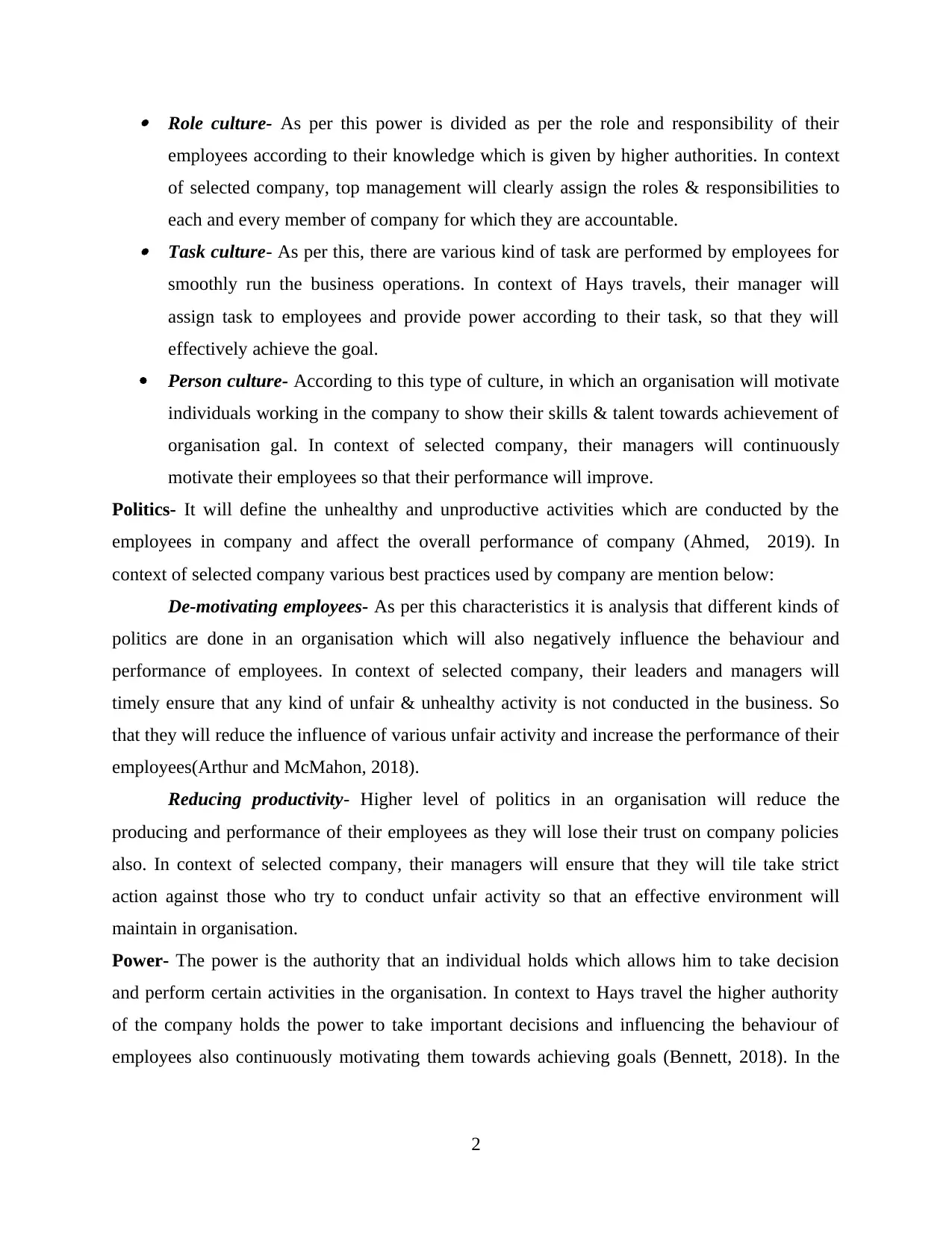
Role culture- As per this power is divided as per the role and responsibility of their
employees according to their knowledge which is given by higher authorities. In context
of selected company, top management will clearly assign the roles & responsibilities to
each and every member of company for which they are accountable. Task culture- As per this, there are various kind of task are performed by employees for
smoothly run the business operations. In context of Hays travels, their manager will
assign task to employees and provide power according to their task, so that they will
effectively achieve the goal.
Person culture- According to this type of culture, in which an organisation will motivate
individuals working in the company to show their skills & talent towards achievement of
organisation gal. In context of selected company, their managers will continuously
motivate their employees so that their performance will improve.
Politics- It will define the unhealthy and unproductive activities which are conducted by the
employees in company and affect the overall performance of company (Ahmed, 2019). In
context of selected company various best practices used by company are mention below:
De-motivating employees- As per this characteristics it is analysis that different kinds of
politics are done in an organisation which will also negatively influence the behaviour and
performance of employees. In context of selected company, their leaders and managers will
timely ensure that any kind of unfair & unhealthy activity is not conducted in the business. So
that they will reduce the influence of various unfair activity and increase the performance of their
employees(Arthur and McMahon, 2018).
Reducing productivity- Higher level of politics in an organisation will reduce the
producing and performance of their employees as they will lose their trust on company policies
also. In context of selected company, their managers will ensure that they will tile take strict
action against those who try to conduct unfair activity so that an effective environment will
maintain in organisation.
Power- The power is the authority that an individual holds which allows him to take decision
and perform certain activities in the organisation. In context to Hays travel the higher authority
of the company holds the power to take important decisions and influencing the behaviour of
employees also continuously motivating them towards achieving goals (Bennett, 2018). In the
2
employees according to their knowledge which is given by higher authorities. In context
of selected company, top management will clearly assign the roles & responsibilities to
each and every member of company for which they are accountable. Task culture- As per this, there are various kind of task are performed by employees for
smoothly run the business operations. In context of Hays travels, their manager will
assign task to employees and provide power according to their task, so that they will
effectively achieve the goal.
Person culture- According to this type of culture, in which an organisation will motivate
individuals working in the company to show their skills & talent towards achievement of
organisation gal. In context of selected company, their managers will continuously
motivate their employees so that their performance will improve.
Politics- It will define the unhealthy and unproductive activities which are conducted by the
employees in company and affect the overall performance of company (Ahmed, 2019). In
context of selected company various best practices used by company are mention below:
De-motivating employees- As per this characteristics it is analysis that different kinds of
politics are done in an organisation which will also negatively influence the behaviour and
performance of employees. In context of selected company, their leaders and managers will
timely ensure that any kind of unfair & unhealthy activity is not conducted in the business. So
that they will reduce the influence of various unfair activity and increase the performance of their
employees(Arthur and McMahon, 2018).
Reducing productivity- Higher level of politics in an organisation will reduce the
producing and performance of their employees as they will lose their trust on company policies
also. In context of selected company, their managers will ensure that they will tile take strict
action against those who try to conduct unfair activity so that an effective environment will
maintain in organisation.
Power- The power is the authority that an individual holds which allows him to take decision
and perform certain activities in the organisation. In context to Hays travel the higher authority
of the company holds the power to take important decisions and influencing the behaviour of
employees also continuously motivating them towards achieving goals (Bennett, 2018). In the
2
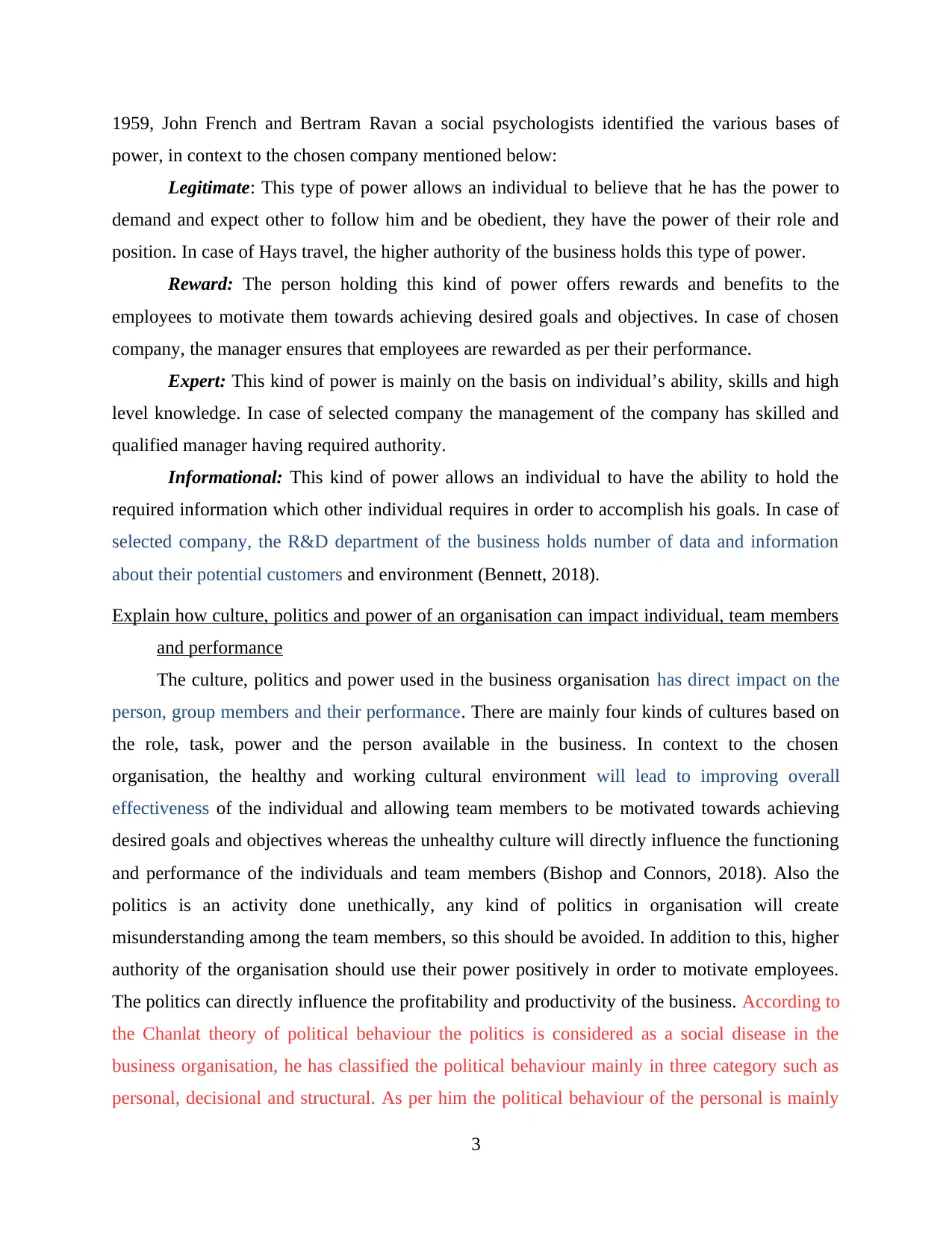
1959, John French and Bertram Ravan a social psychologists identified the various bases of
power, in context to the chosen company mentioned below:
Legitimate: This type of power allows an individual to believe that he has the power to
demand and expect other to follow him and be obedient, they have the power of their role and
position. In case of Hays travel, the higher authority of the business holds this type of power.
Reward: The person holding this kind of power offers rewards and benefits to the
employees to motivate them towards achieving desired goals and objectives. In case of chosen
company, the manager ensures that employees are rewarded as per their performance.
Expert: This kind of power is mainly on the basis on individual’s ability, skills and high
level knowledge. In case of selected company the management of the company has skilled and
qualified manager having required authority.
Informational: This kind of power allows an individual to have the ability to hold the
required information which other individual requires in order to accomplish his goals. In case of
selected company, the R&D department of the business holds number of data and information
about their potential customers and environment (Bennett, 2018).
Explain how culture, politics and power of an organisation can impact individual, team members
and performance
The culture, politics and power used in the business organisation has direct impact on the
person, group members and their performance. There are mainly four kinds of cultures based on
the role, task, power and the person available in the business. In context to the chosen
organisation, the healthy and working cultural environment will lead to improving overall
effectiveness of the individual and allowing team members to be motivated towards achieving
desired goals and objectives whereas the unhealthy culture will directly influence the functioning
and performance of the individuals and team members (Bishop and Connors, 2018). Also the
politics is an activity done unethically, any kind of politics in organisation will create
misunderstanding among the team members, so this should be avoided. In addition to this, higher
authority of the organisation should use their power positively in order to motivate employees.
The politics can directly influence the profitability and productivity of the business. According to
the Chanlat theory of political behaviour the politics is considered as a social disease in the
business organisation, he has classified the political behaviour mainly in three category such as
personal, decisional and structural. As per him the political behaviour of the personal is mainly
3
power, in context to the chosen company mentioned below:
Legitimate: This type of power allows an individual to believe that he has the power to
demand and expect other to follow him and be obedient, they have the power of their role and
position. In case of Hays travel, the higher authority of the business holds this type of power.
Reward: The person holding this kind of power offers rewards and benefits to the
employees to motivate them towards achieving desired goals and objectives. In case of chosen
company, the manager ensures that employees are rewarded as per their performance.
Expert: This kind of power is mainly on the basis on individual’s ability, skills and high
level knowledge. In case of selected company the management of the company has skilled and
qualified manager having required authority.
Informational: This kind of power allows an individual to have the ability to hold the
required information which other individual requires in order to accomplish his goals. In case of
selected company, the R&D department of the business holds number of data and information
about their potential customers and environment (Bennett, 2018).
Explain how culture, politics and power of an organisation can impact individual, team members
and performance
The culture, politics and power used in the business organisation has direct impact on the
person, group members and their performance. There are mainly four kinds of cultures based on
the role, task, power and the person available in the business. In context to the chosen
organisation, the healthy and working cultural environment will lead to improving overall
effectiveness of the individual and allowing team members to be motivated towards achieving
desired goals and objectives whereas the unhealthy culture will directly influence the functioning
and performance of the individuals and team members (Bishop and Connors, 2018). Also the
politics is an activity done unethically, any kind of politics in organisation will create
misunderstanding among the team members, so this should be avoided. In addition to this, higher
authority of the organisation should use their power positively in order to motivate employees.
The politics can directly influence the profitability and productivity of the business. According to
the Chanlat theory of political behaviour the politics is considered as a social disease in the
business organisation, he has classified the political behaviour mainly in three category such as
personal, decisional and structural. As per him the political behaviour of the personal is mainly
3
⊘ This is a preview!⊘
Do you want full access?
Subscribe today to unlock all pages.

Trusted by 1+ million students worldwide
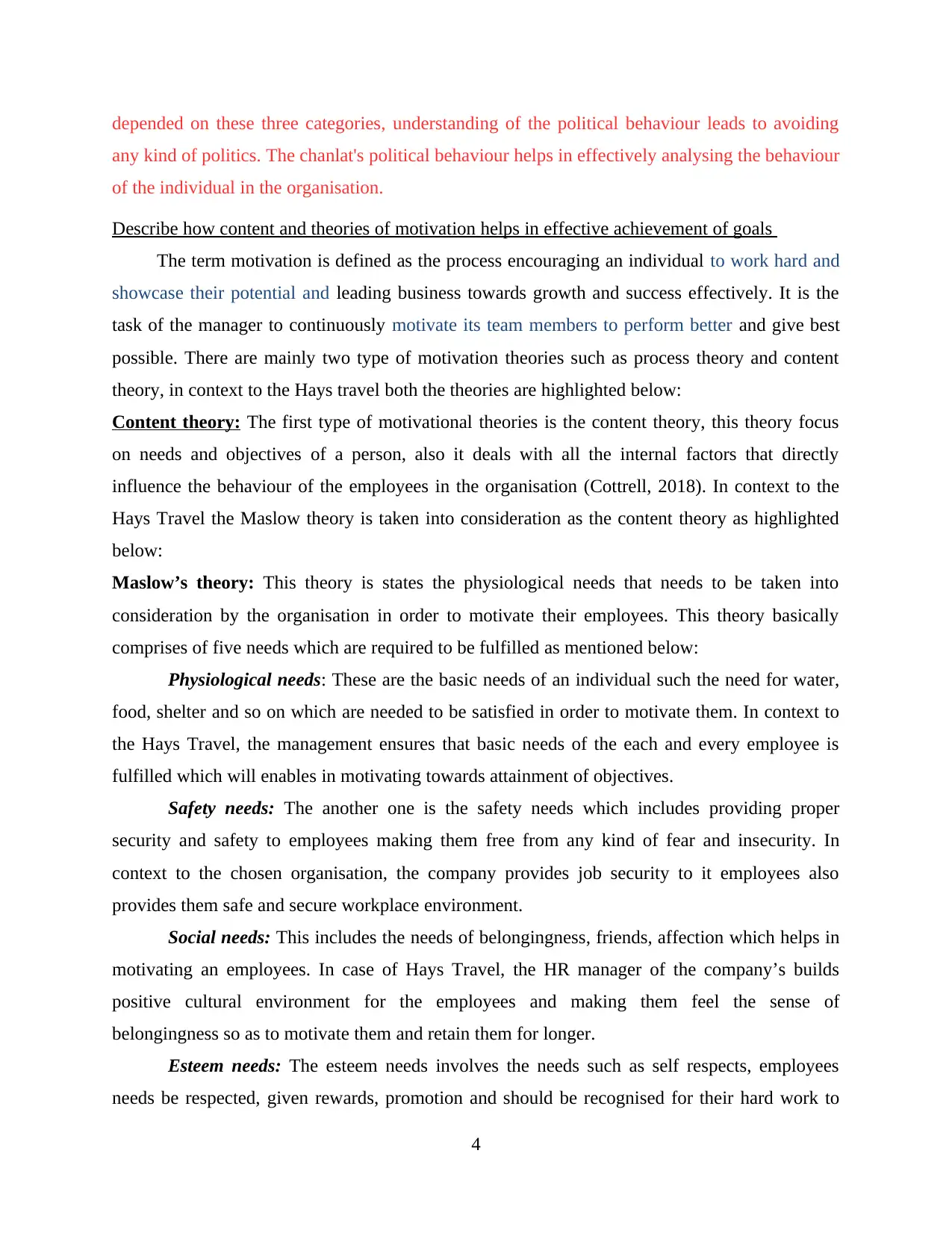
depended on these three categories, understanding of the political behaviour leads to avoiding
any kind of politics. The chanlat's political behaviour helps in effectively analysing the behaviour
of the individual in the organisation.
Describe how content and theories of motivation helps in effective achievement of goals
The term motivation is defined as the process encouraging an individual to work hard and
showcase their potential and leading business towards growth and success effectively. It is the
task of the manager to continuously motivate its team members to perform better and give best
possible. There are mainly two type of motivation theories such as process theory and content
theory, in context to the Hays travel both the theories are highlighted below:
Content theory: The first type of motivational theories is the content theory, this theory focus
on needs and objectives of a person, also it deals with all the internal factors that directly
influence the behaviour of the employees in the organisation (Cottrell, 2018). In context to the
Hays Travel the Maslow theory is taken into consideration as the content theory as highlighted
below:
Maslow’s theory: This theory is states the physiological needs that needs to be taken into
consideration by the organisation in order to motivate their employees. This theory basically
comprises of five needs which are required to be fulfilled as mentioned below:
Physiological needs: These are the basic needs of an individual such the need for water,
food, shelter and so on which are needed to be satisfied in order to motivate them. In context to
the Hays Travel, the management ensures that basic needs of the each and every employee is
fulfilled which will enables in motivating towards attainment of objectives.
Safety needs: The another one is the safety needs which includes providing proper
security and safety to employees making them free from any kind of fear and insecurity. In
context to the chosen organisation, the company provides job security to it employees also
provides them safe and secure workplace environment.
Social needs: This includes the needs of belongingness, friends, affection which helps in
motivating an employees. In case of Hays Travel, the HR manager of the company’s builds
positive cultural environment for the employees and making them feel the sense of
belongingness so as to motivate them and retain them for longer.
Esteem needs: The esteem needs involves the needs such as self respects, employees
needs be respected, given rewards, promotion and should be recognised for their hard work to
4
any kind of politics. The chanlat's political behaviour helps in effectively analysing the behaviour
of the individual in the organisation.
Describe how content and theories of motivation helps in effective achievement of goals
The term motivation is defined as the process encouraging an individual to work hard and
showcase their potential and leading business towards growth and success effectively. It is the
task of the manager to continuously motivate its team members to perform better and give best
possible. There are mainly two type of motivation theories such as process theory and content
theory, in context to the Hays travel both the theories are highlighted below:
Content theory: The first type of motivational theories is the content theory, this theory focus
on needs and objectives of a person, also it deals with all the internal factors that directly
influence the behaviour of the employees in the organisation (Cottrell, 2018). In context to the
Hays Travel the Maslow theory is taken into consideration as the content theory as highlighted
below:
Maslow’s theory: This theory is states the physiological needs that needs to be taken into
consideration by the organisation in order to motivate their employees. This theory basically
comprises of five needs which are required to be fulfilled as mentioned below:
Physiological needs: These are the basic needs of an individual such the need for water,
food, shelter and so on which are needed to be satisfied in order to motivate them. In context to
the Hays Travel, the management ensures that basic needs of the each and every employee is
fulfilled which will enables in motivating towards attainment of objectives.
Safety needs: The another one is the safety needs which includes providing proper
security and safety to employees making them free from any kind of fear and insecurity. In
context to the chosen organisation, the company provides job security to it employees also
provides them safe and secure workplace environment.
Social needs: This includes the needs of belongingness, friends, affection which helps in
motivating an employees. In case of Hays Travel, the HR manager of the company’s builds
positive cultural environment for the employees and making them feel the sense of
belongingness so as to motivate them and retain them for longer.
Esteem needs: The esteem needs involves the needs such as self respects, employees
needs be respected, given rewards, promotion and should be recognised for their hard work to
4
Paraphrase This Document
Need a fresh take? Get an instant paraphrase of this document with our AI Paraphraser
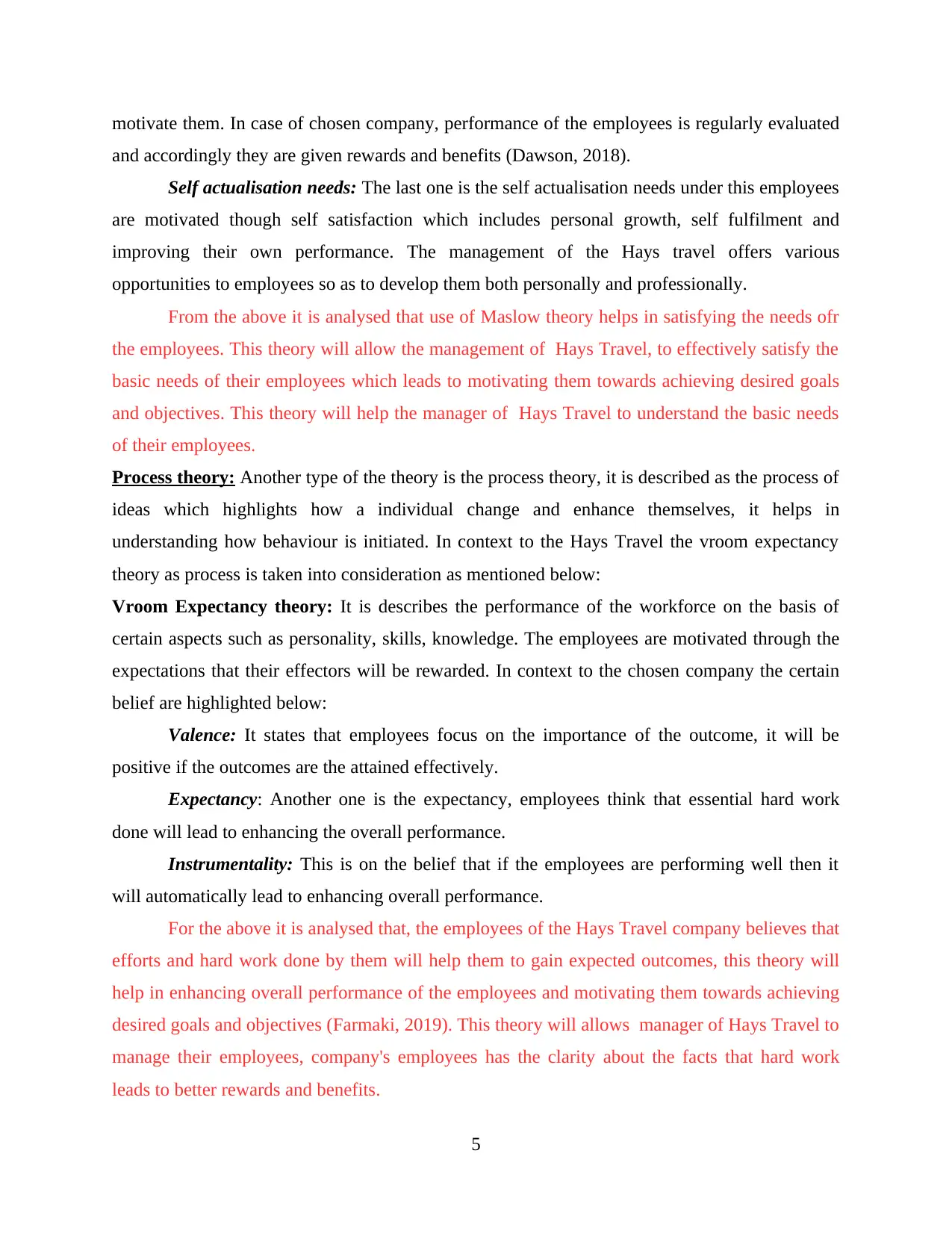
motivate them. In case of chosen company, performance of the employees is regularly evaluated
and accordingly they are given rewards and benefits (Dawson, 2018).
Self actualisation needs: The last one is the self actualisation needs under this employees
are motivated though self satisfaction which includes personal growth, self fulfilment and
improving their own performance. The management of the Hays travel offers various
opportunities to employees so as to develop them both personally and professionally.
From the above it is analysed that use of Maslow theory helps in satisfying the needs ofr
the employees. This theory will allow the management of Hays Travel, to effectively satisfy the
basic needs of their employees which leads to motivating them towards achieving desired goals
and objectives. This theory will help the manager of Hays Travel to understand the basic needs
of their employees.
Process theory: Another type of the theory is the process theory, it is described as the process of
ideas which highlights how a individual change and enhance themselves, it helps in
understanding how behaviour is initiated. In context to the Hays Travel the vroom expectancy
theory as process is taken into consideration as mentioned below:
Vroom Expectancy theory: It is describes the performance of the workforce on the basis of
certain aspects such as personality, skills, knowledge. The employees are motivated through the
expectations that their effectors will be rewarded. In context to the chosen company the certain
belief are highlighted below:
Valence: It states that employees focus on the importance of the outcome, it will be
positive if the outcomes are the attained effectively.
Expectancy: Another one is the expectancy, employees think that essential hard work
done will lead to enhancing the overall performance.
Instrumentality: This is on the belief that if the employees are performing well then it
will automatically lead to enhancing overall performance.
For the above it is analysed that, the employees of the Hays Travel company believes that
efforts and hard work done by them will help them to gain expected outcomes, this theory will
help in enhancing overall performance of the employees and motivating them towards achieving
desired goals and objectives (Farmaki, 2019). This theory will allows manager of Hays Travel to
manage their employees, company's employees has the clarity about the facts that hard work
leads to better rewards and benefits.
5
and accordingly they are given rewards and benefits (Dawson, 2018).
Self actualisation needs: The last one is the self actualisation needs under this employees
are motivated though self satisfaction which includes personal growth, self fulfilment and
improving their own performance. The management of the Hays travel offers various
opportunities to employees so as to develop them both personally and professionally.
From the above it is analysed that use of Maslow theory helps in satisfying the needs ofr
the employees. This theory will allow the management of Hays Travel, to effectively satisfy the
basic needs of their employees which leads to motivating them towards achieving desired goals
and objectives. This theory will help the manager of Hays Travel to understand the basic needs
of their employees.
Process theory: Another type of the theory is the process theory, it is described as the process of
ideas which highlights how a individual change and enhance themselves, it helps in
understanding how behaviour is initiated. In context to the Hays Travel the vroom expectancy
theory as process is taken into consideration as mentioned below:
Vroom Expectancy theory: It is describes the performance of the workforce on the basis of
certain aspects such as personality, skills, knowledge. The employees are motivated through the
expectations that their effectors will be rewarded. In context to the chosen company the certain
belief are highlighted below:
Valence: It states that employees focus on the importance of the outcome, it will be
positive if the outcomes are the attained effectively.
Expectancy: Another one is the expectancy, employees think that essential hard work
done will lead to enhancing the overall performance.
Instrumentality: This is on the belief that if the employees are performing well then it
will automatically lead to enhancing overall performance.
For the above it is analysed that, the employees of the Hays Travel company believes that
efforts and hard work done by them will help them to gain expected outcomes, this theory will
help in enhancing overall performance of the employees and motivating them towards achieving
desired goals and objectives (Farmaki, 2019). This theory will allows manager of Hays Travel to
manage their employees, company's employees has the clarity about the facts that hard work
leads to better rewards and benefits.
5
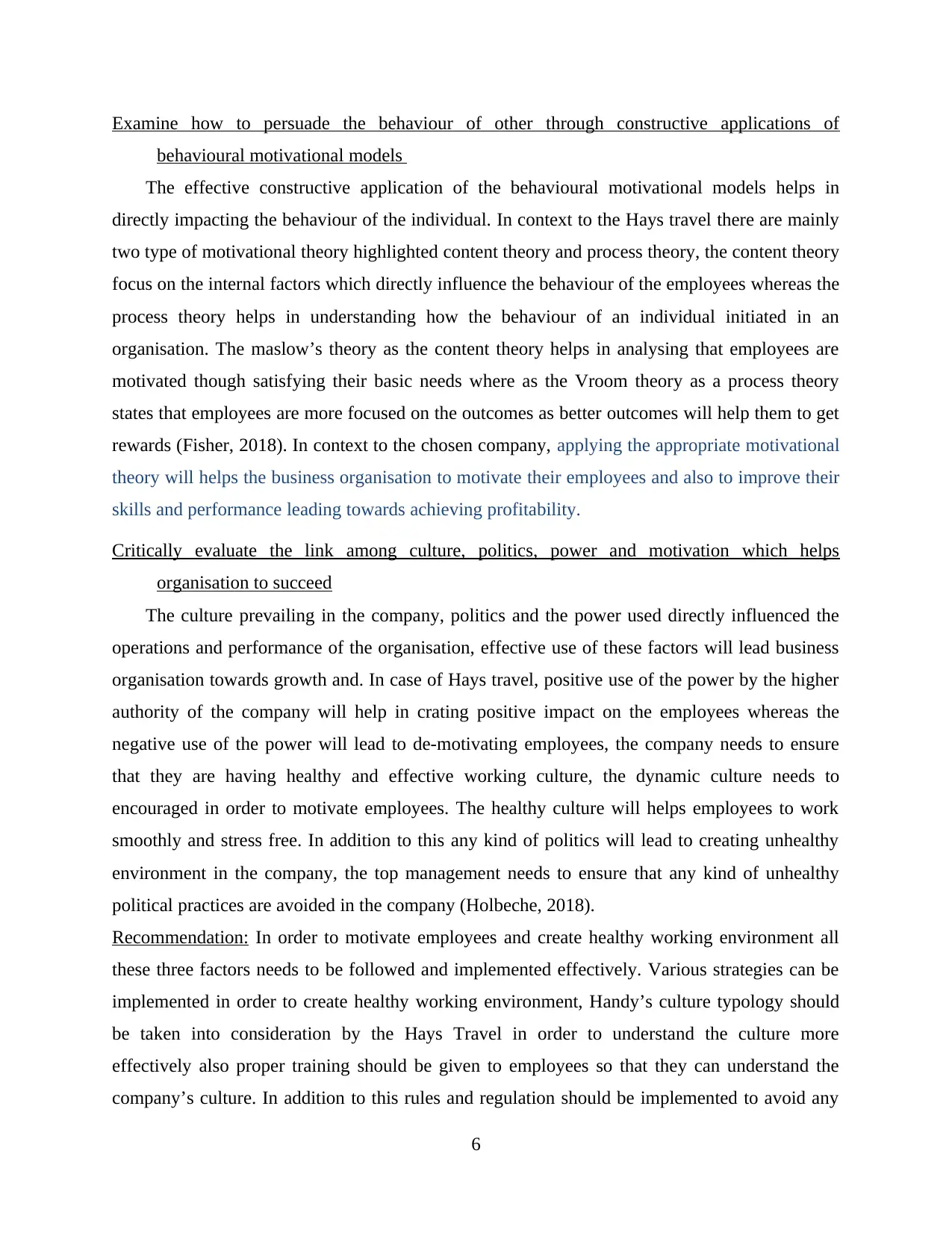
Examine how to persuade the behaviour of other through constructive applications of
behavioural motivational models
The effective constructive application of the behavioural motivational models helps in
directly impacting the behaviour of the individual. In context to the Hays travel there are mainly
two type of motivational theory highlighted content theory and process theory, the content theory
focus on the internal factors which directly influence the behaviour of the employees whereas the
process theory helps in understanding how the behaviour of an individual initiated in an
organisation. The maslow’s theory as the content theory helps in analysing that employees are
motivated though satisfying their basic needs where as the Vroom theory as a process theory
states that employees are more focused on the outcomes as better outcomes will help them to get
rewards (Fisher, 2018). In context to the chosen company, applying the appropriate motivational
theory will helps the business organisation to motivate their employees and also to improve their
skills and performance leading towards achieving profitability.
Critically evaluate the link among culture, politics, power and motivation which helps
organisation to succeed
The culture prevailing in the company, politics and the power used directly influenced the
operations and performance of the organisation, effective use of these factors will lead business
organisation towards growth and. In case of Hays travel, positive use of the power by the higher
authority of the company will help in crating positive impact on the employees whereas the
negative use of the power will lead to de-motivating employees, the company needs to ensure
that they are having healthy and effective working culture, the dynamic culture needs to
encouraged in order to motivate employees. The healthy culture will helps employees to work
smoothly and stress free. In addition to this any kind of politics will lead to creating unhealthy
environment in the company, the top management needs to ensure that any kind of unhealthy
political practices are avoided in the company (Holbeche, 2018).
Recommendation: In order to motivate employees and create healthy working environment all
these three factors needs to be followed and implemented effectively. Various strategies can be
implemented in order to create healthy working environment, Handy’s culture typology should
be taken into consideration by the Hays Travel in order to understand the culture more
effectively also proper training should be given to employees so that they can understand the
company’s culture. In addition to this rules and regulation should be implemented to avoid any
6
behavioural motivational models
The effective constructive application of the behavioural motivational models helps in
directly impacting the behaviour of the individual. In context to the Hays travel there are mainly
two type of motivational theory highlighted content theory and process theory, the content theory
focus on the internal factors which directly influence the behaviour of the employees whereas the
process theory helps in understanding how the behaviour of an individual initiated in an
organisation. The maslow’s theory as the content theory helps in analysing that employees are
motivated though satisfying their basic needs where as the Vroom theory as a process theory
states that employees are more focused on the outcomes as better outcomes will help them to get
rewards (Fisher, 2018). In context to the chosen company, applying the appropriate motivational
theory will helps the business organisation to motivate their employees and also to improve their
skills and performance leading towards achieving profitability.
Critically evaluate the link among culture, politics, power and motivation which helps
organisation to succeed
The culture prevailing in the company, politics and the power used directly influenced the
operations and performance of the organisation, effective use of these factors will lead business
organisation towards growth and. In case of Hays travel, positive use of the power by the higher
authority of the company will help in crating positive impact on the employees whereas the
negative use of the power will lead to de-motivating employees, the company needs to ensure
that they are having healthy and effective working culture, the dynamic culture needs to
encouraged in order to motivate employees. The healthy culture will helps employees to work
smoothly and stress free. In addition to this any kind of politics will lead to creating unhealthy
environment in the company, the top management needs to ensure that any kind of unhealthy
political practices are avoided in the company (Holbeche, 2018).
Recommendation: In order to motivate employees and create healthy working environment all
these three factors needs to be followed and implemented effectively. Various strategies can be
implemented in order to create healthy working environment, Handy’s culture typology should
be taken into consideration by the Hays Travel in order to understand the culture more
effectively also proper training should be given to employees so that they can understand the
company’s culture. In addition to this rules and regulation should be implemented to avoid any
6
⊘ This is a preview!⊘
Do you want full access?
Subscribe today to unlock all pages.

Trusted by 1+ million students worldwide
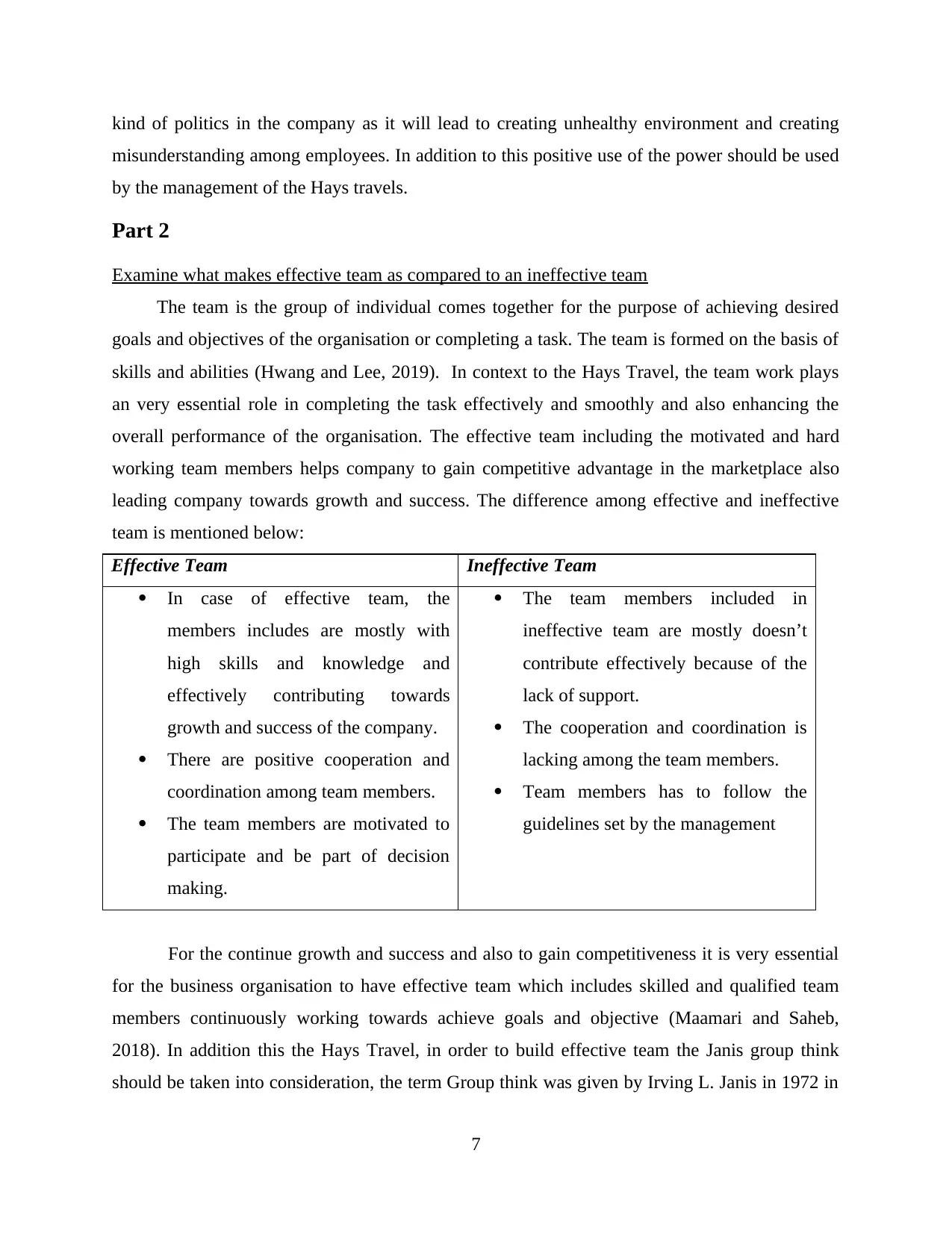
kind of politics in the company as it will lead to creating unhealthy environment and creating
misunderstanding among employees. In addition to this positive use of the power should be used
by the management of the Hays travels.
Part 2
Examine what makes effective team as compared to an ineffective team
The team is the group of individual comes together for the purpose of achieving desired
goals and objectives of the organisation or completing a task. The team is formed on the basis of
skills and abilities (Hwang and Lee, 2019). In context to the Hays Travel, the team work plays
an very essential role in completing the task effectively and smoothly and also enhancing the
overall performance of the organisation. The effective team including the motivated and hard
working team members helps company to gain competitive advantage in the marketplace also
leading company towards growth and success. The difference among effective and ineffective
team is mentioned below:
Effective Team Ineffective Team
In case of effective team, the
members includes are mostly with
high skills and knowledge and
effectively contributing towards
growth and success of the company.
There are positive cooperation and
coordination among team members.
The team members are motivated to
participate and be part of decision
making.
The team members included in
ineffective team are mostly doesn’t
contribute effectively because of the
lack of support.
The cooperation and coordination is
lacking among the team members.
Team members has to follow the
guidelines set by the management
For the continue growth and success and also to gain competitiveness it is very essential
for the business organisation to have effective team which includes skilled and qualified team
members continuously working towards achieve goals and objective (Maamari and Saheb,
2018). In addition this the Hays Travel, in order to build effective team the Janis group think
should be taken into consideration, the term Group think was given by Irving L. Janis in 1972 in
7
misunderstanding among employees. In addition to this positive use of the power should be used
by the management of the Hays travels.
Part 2
Examine what makes effective team as compared to an ineffective team
The team is the group of individual comes together for the purpose of achieving desired
goals and objectives of the organisation or completing a task. The team is formed on the basis of
skills and abilities (Hwang and Lee, 2019). In context to the Hays Travel, the team work plays
an very essential role in completing the task effectively and smoothly and also enhancing the
overall performance of the organisation. The effective team including the motivated and hard
working team members helps company to gain competitive advantage in the marketplace also
leading company towards growth and success. The difference among effective and ineffective
team is mentioned below:
Effective Team Ineffective Team
In case of effective team, the
members includes are mostly with
high skills and knowledge and
effectively contributing towards
growth and success of the company.
There are positive cooperation and
coordination among team members.
The team members are motivated to
participate and be part of decision
making.
The team members included in
ineffective team are mostly doesn’t
contribute effectively because of the
lack of support.
The cooperation and coordination is
lacking among the team members.
Team members has to follow the
guidelines set by the management
For the continue growth and success and also to gain competitiveness it is very essential
for the business organisation to have effective team which includes skilled and qualified team
members continuously working towards achieve goals and objective (Maamari and Saheb,
2018). In addition this the Hays Travel, in order to build effective team the Janis group think
should be taken into consideration, the term Group think was given by Irving L. Janis in 1972 in
7
Paraphrase This Document
Need a fresh take? Get an instant paraphrase of this document with our AI Paraphraser
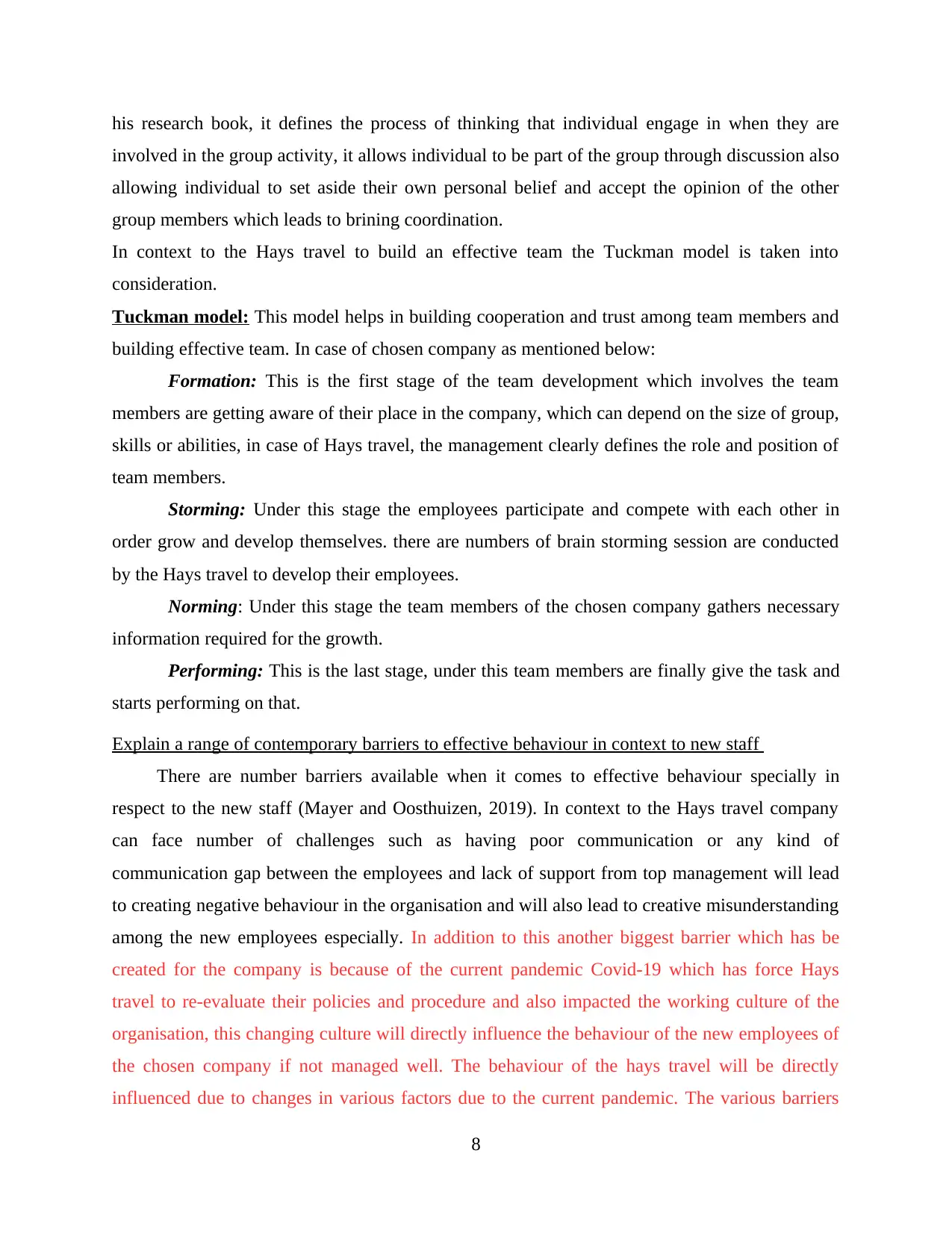
his research book, it defines the process of thinking that individual engage in when they are
involved in the group activity, it allows individual to be part of the group through discussion also
allowing individual to set aside their own personal belief and accept the opinion of the other
group members which leads to brining coordination.
In context to the Hays travel to build an effective team the Tuckman model is taken into
consideration.
Tuckman model: This model helps in building cooperation and trust among team members and
building effective team. In case of chosen company as mentioned below:
Formation: This is the first stage of the team development which involves the team
members are getting aware of their place in the company, which can depend on the size of group,
skills or abilities, in case of Hays travel, the management clearly defines the role and position of
team members.
Storming: Under this stage the employees participate and compete with each other in
order grow and develop themselves. there are numbers of brain storming session are conducted
by the Hays travel to develop their employees.
Norming: Under this stage the team members of the chosen company gathers necessary
information required for the growth.
Performing: This is the last stage, under this team members are finally give the task and
starts performing on that.
Explain a range of contemporary barriers to effective behaviour in context to new staff
There are number barriers available when it comes to effective behaviour specially in
respect to the new staff (Mayer and Oosthuizen, 2019). In context to the Hays travel company
can face number of challenges such as having poor communication or any kind of
communication gap between the employees and lack of support from top management will lead
to creating negative behaviour in the organisation and will also lead to creative misunderstanding
among the new employees especially. In addition to this another biggest barrier which has be
created for the company is because of the current pandemic Covid-19 which has force Hays
travel to re-evaluate their policies and procedure and also impacted the working culture of the
organisation, this changing culture will directly influence the behaviour of the new employees of
the chosen company if not managed well. The behaviour of the hays travel will be directly
influenced due to changes in various factors due to the current pandemic. The various barriers
8
involved in the group activity, it allows individual to be part of the group through discussion also
allowing individual to set aside their own personal belief and accept the opinion of the other
group members which leads to brining coordination.
In context to the Hays travel to build an effective team the Tuckman model is taken into
consideration.
Tuckman model: This model helps in building cooperation and trust among team members and
building effective team. In case of chosen company as mentioned below:
Formation: This is the first stage of the team development which involves the team
members are getting aware of their place in the company, which can depend on the size of group,
skills or abilities, in case of Hays travel, the management clearly defines the role and position of
team members.
Storming: Under this stage the employees participate and compete with each other in
order grow and develop themselves. there are numbers of brain storming session are conducted
by the Hays travel to develop their employees.
Norming: Under this stage the team members of the chosen company gathers necessary
information required for the growth.
Performing: This is the last stage, under this team members are finally give the task and
starts performing on that.
Explain a range of contemporary barriers to effective behaviour in context to new staff
There are number barriers available when it comes to effective behaviour specially in
respect to the new staff (Mayer and Oosthuizen, 2019). In context to the Hays travel company
can face number of challenges such as having poor communication or any kind of
communication gap between the employees and lack of support from top management will lead
to creating negative behaviour in the organisation and will also lead to creative misunderstanding
among the new employees especially. In addition to this another biggest barrier which has be
created for the company is because of the current pandemic Covid-19 which has force Hays
travel to re-evaluate their policies and procedure and also impacted the working culture of the
organisation, this changing culture will directly influence the behaviour of the new employees of
the chosen company if not managed well. The behaviour of the hays travel will be directly
influenced due to changes in various factors due to the current pandemic. The various barriers
8
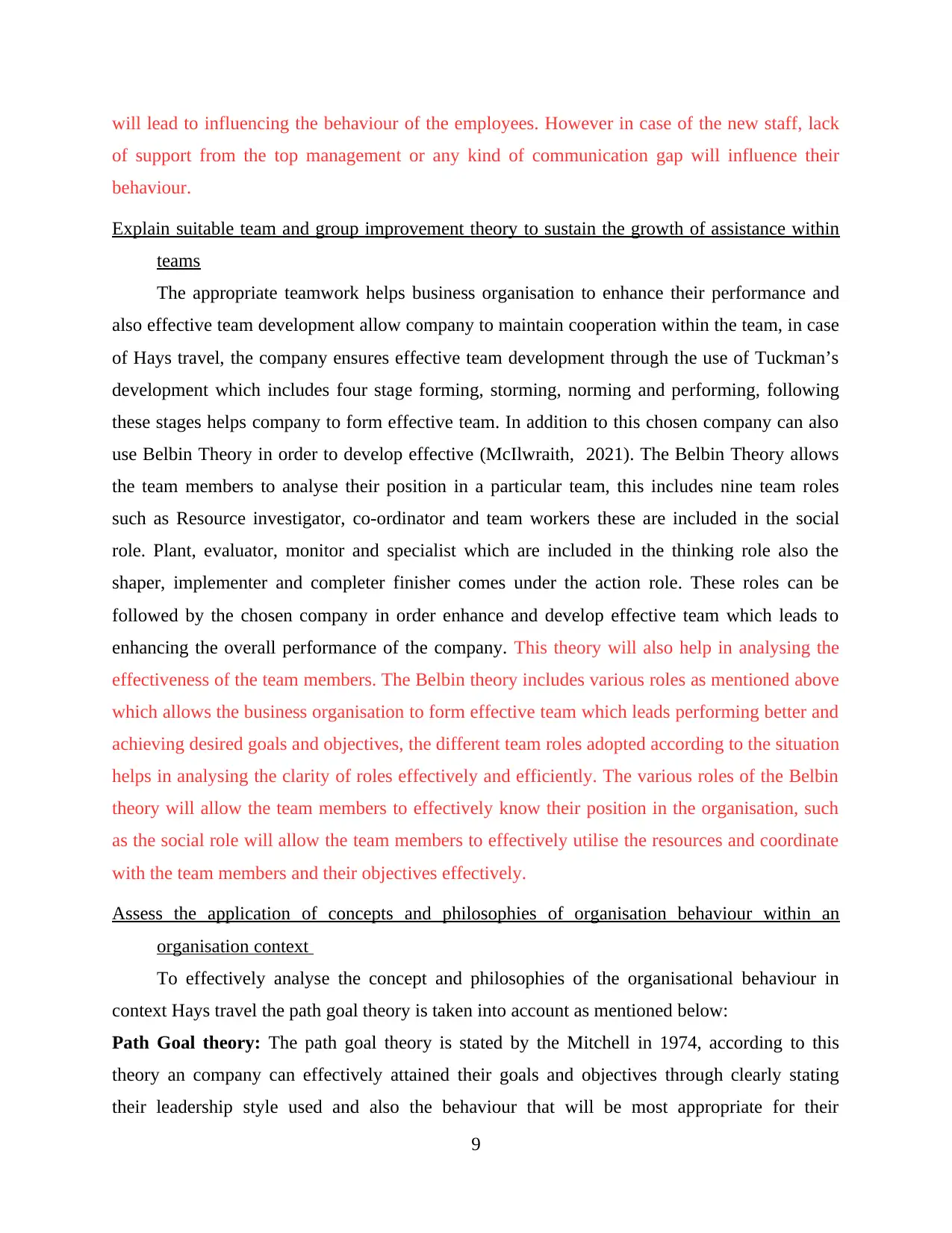
will lead to influencing the behaviour of the employees. However in case of the new staff, lack
of support from the top management or any kind of communication gap will influence their
behaviour.
Explain suitable team and group improvement theory to sustain the growth of assistance within
teams
The appropriate teamwork helps business organisation to enhance their performance and
also effective team development allow company to maintain cooperation within the team, in case
of Hays travel, the company ensures effective team development through the use of Tuckman’s
development which includes four stage forming, storming, norming and performing, following
these stages helps company to form effective team. In addition to this chosen company can also
use Belbin Theory in order to develop effective (McIlwraith, 2021). The Belbin Theory allows
the team members to analyse their position in a particular team, this includes nine team roles
such as Resource investigator, co-ordinator and team workers these are included in the social
role. Plant, evaluator, monitor and specialist which are included in the thinking role also the
shaper, implementer and completer finisher comes under the action role. These roles can be
followed by the chosen company in order enhance and develop effective team which leads to
enhancing the overall performance of the company. This theory will also help in analysing the
effectiveness of the team members. The Belbin theory includes various roles as mentioned above
which allows the business organisation to form effective team which leads performing better and
achieving desired goals and objectives, the different team roles adopted according to the situation
helps in analysing the clarity of roles effectively and efficiently. The various roles of the Belbin
theory will allow the team members to effectively know their position in the organisation, such
as the social role will allow the team members to effectively utilise the resources and coordinate
with the team members and their objectives effectively.
Assess the application of concepts and philosophies of organisation behaviour within an
organisation context
To effectively analyse the concept and philosophies of the organisational behaviour in
context Hays travel the path goal theory is taken into account as mentioned below:
Path Goal theory: The path goal theory is stated by the Mitchell in 1974, according to this
theory an company can effectively attained their goals and objectives through clearly stating
their leadership style used and also the behaviour that will be most appropriate for their
9
of support from the top management or any kind of communication gap will influence their
behaviour.
Explain suitable team and group improvement theory to sustain the growth of assistance within
teams
The appropriate teamwork helps business organisation to enhance their performance and
also effective team development allow company to maintain cooperation within the team, in case
of Hays travel, the company ensures effective team development through the use of Tuckman’s
development which includes four stage forming, storming, norming and performing, following
these stages helps company to form effective team. In addition to this chosen company can also
use Belbin Theory in order to develop effective (McIlwraith, 2021). The Belbin Theory allows
the team members to analyse their position in a particular team, this includes nine team roles
such as Resource investigator, co-ordinator and team workers these are included in the social
role. Plant, evaluator, monitor and specialist which are included in the thinking role also the
shaper, implementer and completer finisher comes under the action role. These roles can be
followed by the chosen company in order enhance and develop effective team which leads to
enhancing the overall performance of the company. This theory will also help in analysing the
effectiveness of the team members. The Belbin theory includes various roles as mentioned above
which allows the business organisation to form effective team which leads performing better and
achieving desired goals and objectives, the different team roles adopted according to the situation
helps in analysing the clarity of roles effectively and efficiently. The various roles of the Belbin
theory will allow the team members to effectively know their position in the organisation, such
as the social role will allow the team members to effectively utilise the resources and coordinate
with the team members and their objectives effectively.
Assess the application of concepts and philosophies of organisation behaviour within an
organisation context
To effectively analyse the concept and philosophies of the organisational behaviour in
context Hays travel the path goal theory is taken into account as mentioned below:
Path Goal theory: The path goal theory is stated by the Mitchell in 1974, according to this
theory an company can effectively attained their goals and objectives through clearly stating
their leadership style used and also the behaviour that will be most appropriate for their
9
⊘ This is a preview!⊘
Do you want full access?
Subscribe today to unlock all pages.

Trusted by 1+ million students worldwide
1 out of 16
Related Documents
Your All-in-One AI-Powered Toolkit for Academic Success.
+13062052269
info@desklib.com
Available 24*7 on WhatsApp / Email
![[object Object]](/_next/static/media/star-bottom.7253800d.svg)
Unlock your academic potential
Copyright © 2020–2026 A2Z Services. All Rights Reserved. Developed and managed by ZUCOL.




